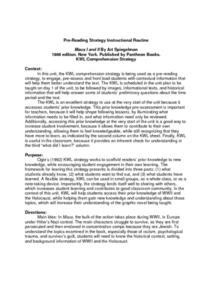Conneticut Department of Education
Instructional Strategies That Facilitate Learning Across Content Areas
Imagine 28 instructional strategies, appropriate for all subject areas and all grade levels. Directed Reading-Thinking Activities (DRTA), Question-Answer Relationship (QAR) activities, KWL charts, comparison matrixes, classification...
Curated OER
KWL Comprehension Strategy: Maus I and II
How much does your class know about World War II? Before reading Art Spiegelman's Maus I, lead your class in creating a KWL chart. Knowing the background and setting of the novel are extremely important in understanding this survivor's...
Curated OER
The Old Man and the Sea: The K-W-H-L Strategy
Make note of what readers know, what to know, and have learned during a unit on Ernest Hemingway's The Old Man and the Sea. As class members read the book, they jot down their ideas on a KWHL chart, and consider what they have...
Curated OER
Twelfth Night: The K-W-H-L Strategy
Readers of Twelfth Night use a KWHL chart to record information about what they know about Shakespeare's play, what they want to find out, how they plan on finding this information, and what they have learned or still want to learn about...
Curated OER
Wildwood Dancing: K-W-H-L Reading Strategy On Prejudice
As part of a study of Juliet Marillier's Wildwood Dancing, class members create a KWHL chart listing what they know, what the want to know, how they will find information, and what they have learned about prejudice.
Curated OER
Shizuko’s Daughter: K-W-L
What would your class like to learn about Japanese culture? Prepare them for a novel unit about Kyoko Mori's Shizuko's Daughter with a KWL chart. After listing what they already know about Japanese culture, they write questions...
Maine Content Literacy Project
Introduction to the Short Story
How should pupils read short stories? Set them up for this unit with an introductory lesson that goes over the main characteristics of a short story and starts learners off reading their first short story of the unit. In order to get a...
Curated OER
The Primary Issue
Students analyze the 2008 presidential primaries by reading and discussing the New York Times Upfront article "Primary Matters." They complete a KWL chart, complete a handout, read the article and answer comprehension questions, and...
Curated OER
Figurative Language and Symbolism
Students identify figurative language and symbolism in poetry as well as prose. In this literary elements lesson, students read and discuss the role of symbolism in Yellow Man by Moonlight, A Christmas Carl, The House of Wings, and...
Curated OER
The Barnum and Bailey Bartered Bride
Students focus on the study of The Bartered Bride by integrating the theme of the circus begin the lesson with a "KWL" strategy map on the Circus. Students are asked: What do you know about the circus?
Curated OER
To Float or Not to Float, That is the Question?
Ninth graders develop operational definition of density, do computations using density equation, categorize pieces of matter as being able to float on
water or not, based on density, explain why some objects sink or float based on...
Curated OER
Watsons Go To Birmingham--1963Patricia Wachholz
Students research the 1960s to prepare for reading the book, The Watsons Go To Birmingham, by Christopher Paul Curtis. They watch a documentary, create a timeline, and listen to music from the 1960s.
Michigan State University
Michigan State University: Intervention for Reading: K W L Strategy
The K-W-L strategy stands for what I Know, what I Want to learn, and what I did Learn. By activating students' background knowledge, it improves comprehension of expository text.












